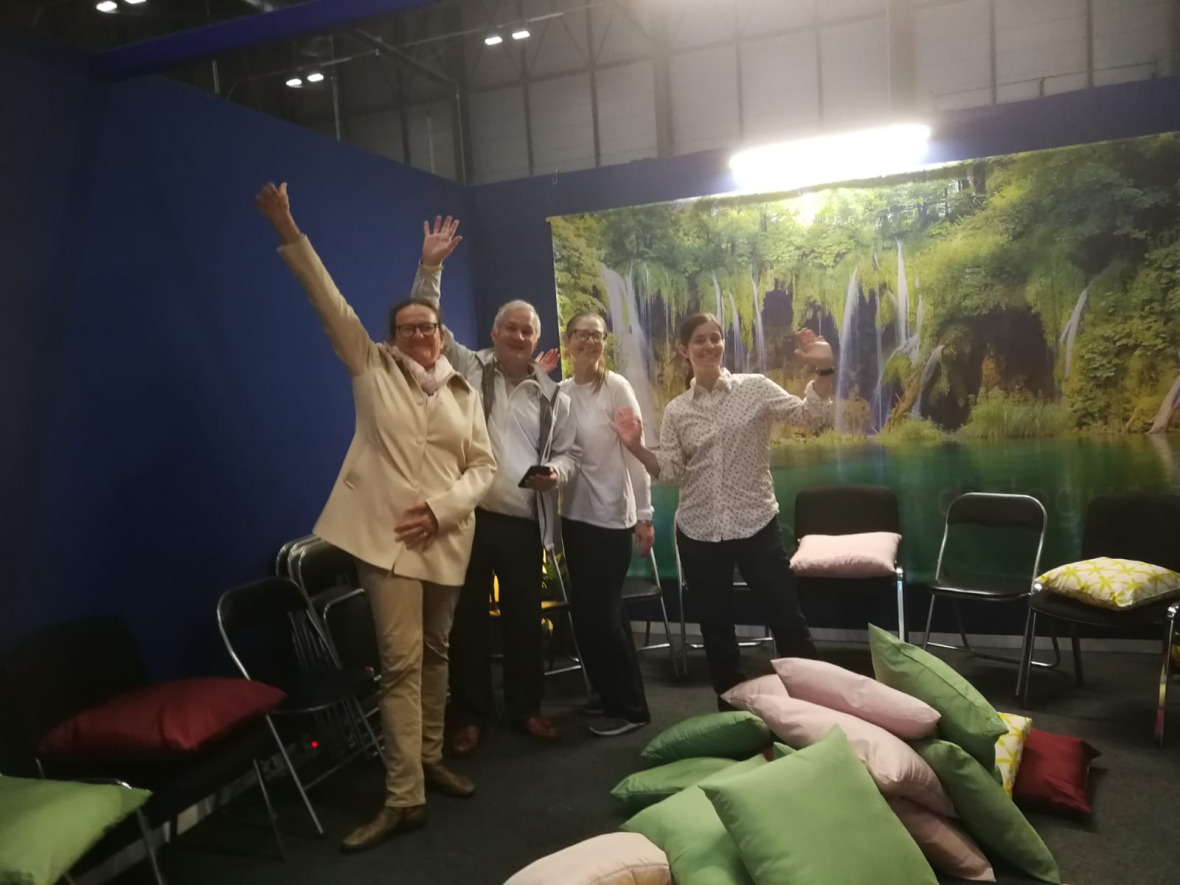Live from Madrid
13.12.2019
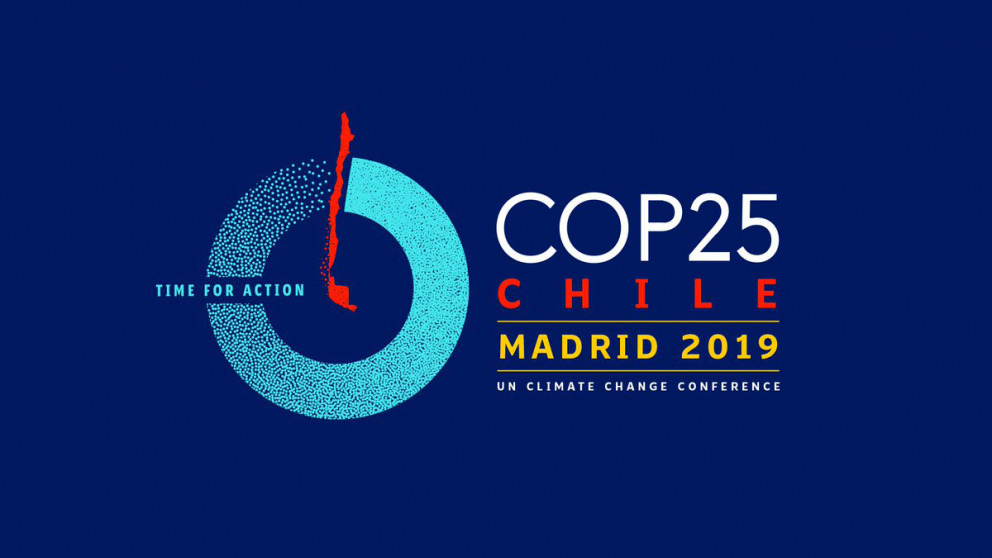
Follow developments at the UN Climate Change Conference in Madrid in the IASS liveblog!

13 December: Last day of COP25
The Conference Climate at the Climate Change Conference: Carolin Fraude in an Interview with Deutschlandfunk Kultur (Podcast in german)
12 December 11:25:25: Minister Svenja Schulze on global coal withdrawal
Coal burning is by far the largest source of greenhouse gases in the world. For global climate protection, it is important that not only coal-fired countries manage the (socially just) phase-out, but also non-coal-fired countries avoid it. At COP25, Minister Svenja Schulze of the Federal Environment Ministry presented the work of the Co-Benefits research project at IASS using South Africa as an example. Co-Benefits is about supporting countries such as South Africa in weighing the consequences of entering the coal market and developing climate-friendly alternatives. In addition to climate protection, there are many arguments for opting for coal and renewable energies in the development and expansion of energy supply. According to IRENA, most new solar plants are already cheaper than new coal-fired power plants.
12 December: A remark from Mark Lawrence
Climate change is symptomatic of our collective, historical willingness to accept environmental hardships of others for the sake of our own benefit, comfort and wealth. There are many examples of this, from deforestation, displacing indigenous peoples, overfishing decimating coastal fishing communities, air and water pollution contributing to millions of premature deaths annually, and catastrophic industrial accidents ravaging communities like in Bhopal. All of these have been easy for society to look away or forget shortly afterwards. If there is anything good coming from climate change, then maybe it will be the first time that we cannot look away, since it’s global, or forget, since it will be persistent over centuries – and if we work hard at it, maybe we can use this as an incentive to finally change this inhumane and unjust characteristic of humanity. (Mark Lawrence)
11 December, Update 12 December, 10:30 am: Slow Politics, Demanding Youth
COP25 has exposed the huge discrepancy between the modest ambitions of the countries involved in the UN negotiation process and the growing urgency with which the public, and young people in particular, are demanding decisive action in the face of the climate crisis. Yesterday afternoon, 200 young people who had organised a sit-in in the main hall of the COP25 venue were forced outside into the cold. I for one am happy that representatives of civil society organisations and the UNFCCC Secretariat found a solution that allowed the protesters to return to the conference. The alternative would have been to take away their entry permits. Although within the rules, that move would only have increased tensions further and eroded public confidence in the negotiation process. I see this episode as indicative of a growing discrepancy between the increasing societal drive for progress on the one hand and the painfully slow pace of the negotiations on the other. This discrepancy was always there – demands formulated in the context of protests have been an abiding feature of COP’s twenty-seven-year history. But thanks to the Fridays for Future movement, the urgency of those scientifically justified demands has grown significantly. Hopefully this tension will not lead to an entrenchment of positions but persuade governments to act and rally broad societal support for effective measures. (Matthias Honegger)
11 December 9:54: Exhibition with letters from children to the COP25
Children have written to the COP what they want and hope for from our heads of government. Here is the wall of letters and I quote my two personal favorites: "Use the money of (us) all well to protect our planet. Please! And: "Dear adults, I want laws that forbid you to leave garbage and you should be able to buy cherry tomatoes without plastic". (Charlotte Unger)
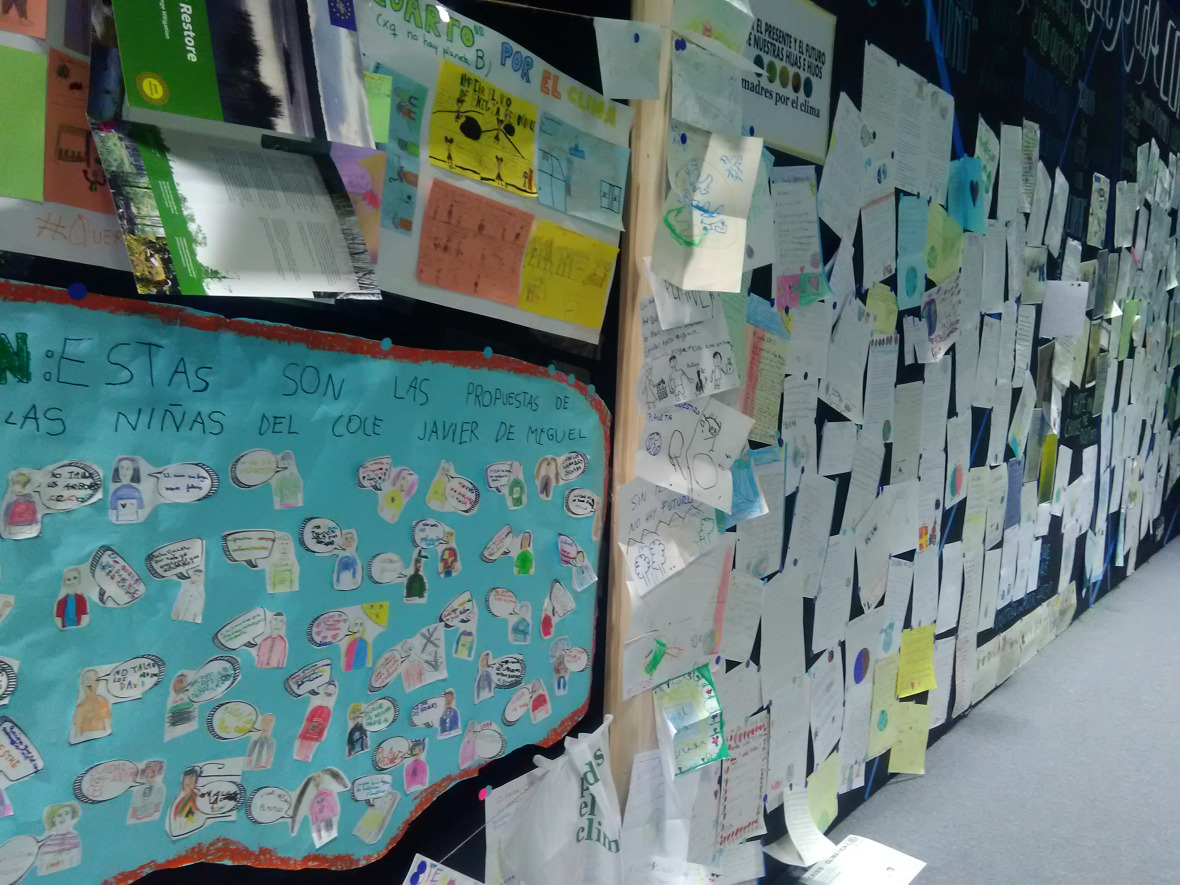
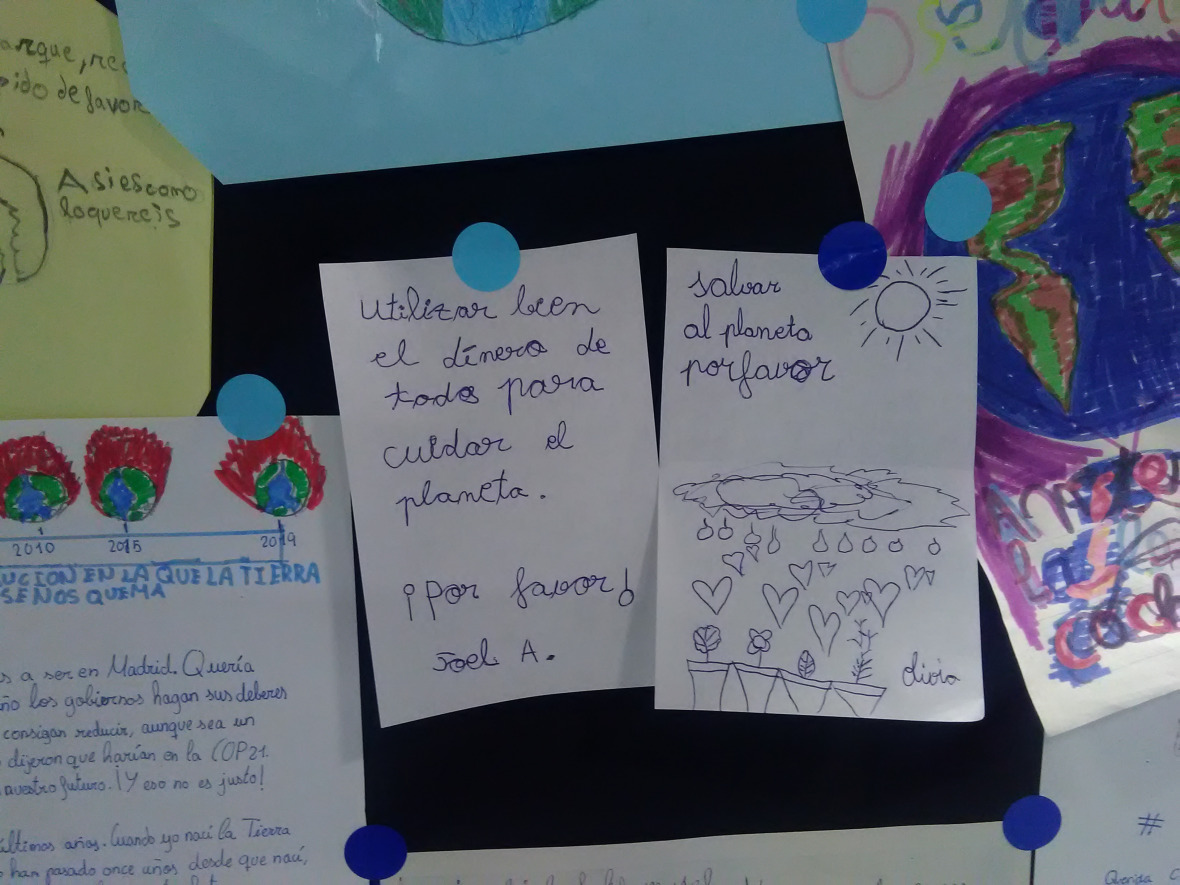

10 December 16:27: Harrison Ford and Mike Bloomberg at the COP25
Ford: “Like many of you here today, I have felt despair for the fate of the world. For our future. A future that includes my 5 kids, my 3 grandkids, your kids. People are scared. Angry. And they are right to be.”
“Let’s listen to young people around the world who will inherit what we have wrought. Their future has already been diminished by our past. We can’t continue to deny them the agency to direct their future. We need to get out of the way and let them lead.”
“We can do this. The antidote to despair is hope and collective action.” Actor Harrison Ford came to COP25 with Mike Bloomberg to build climate action at #AmericasPledge launch event. Bloomberg also wants to run for the next US presidential elections.
Bloomberg was cited before with this Statement: "The reason I am here in Madrid is very simple, I am here because President Trump is not. And I am here because his administration refuses to lead on climate change and so others must do the work. To confront the biggest threat facing humanity it is going to take a global response and that means not just mayors, of elected officials at every level in every party and private sector leaders from around the world all working together." (Héctor Rodríguez)


10 December 2019: Parallel to negotiations "in the Green Zone"
The action "ChauCarbon" of the Chilean protest movement Movimiento Chau Pescao combines art, protest and knowledge: Chilean artists have created postcards with moving images on the reverse of which information is provided about coal-fired power plants in Chile and their socio-ecological effects. Visitors can take the cards with them and send them worldwide to people 'with political influence'. (Charlotte Unger)

8 December 2019 : 'To be is to do' - How Can we Keep the Energy High Midway through the COP 25 in Madrid?
UN Climate Conferences, known as COPs are always epic journeys. This 8 December 2019, I celebrate a decade after my first COP. How could I forget “hopenhagen”, the famous COP 15 in Copenhagen that concluded as“brokenhagen?”
Every COP is different but they all make us physically and mentally tired. Often, I hear people questioning if it is still worth fighting against the climate crisis.
'In times when a child is the main symbol of hope in the fight against climate change, the extreme determination of a woman above 70 in our ocean is deeply inspiring.' – the experience of swimmer Diana Nyad carries many lessons for UN negotiators and sustainability practitioners.
Watch this energizing TED talk and be inspired! In this talk, Diana describes her adventure in the pitch-black night in the ocean, stung by jellyfish, choking on salt water, singing to herself, hallucinating … and never giving up. She has many awesome quotes but the best is: “to be is to do”. With that in mind, Diana Nyad never stopped swimming and that's how she finally achieved her lifetime goal: an extreme 100-mile swim from Cuba to Florida, at age 64!
'I can't help the comparison. Working for planetary health feels like training as an athlete of extreme sports.'
We might sometimes feel like giving up but we simply must not. I'm convinced that our health should be above any economic interest. That's why we need to keep caring about climate change and other environmental topics, independently of the official results of the UN COP 25 in Madrid.
I particularly believe in the power of women to transform policies. That is why our new network Women for Planetary Health, created at COP 25, gives me the strength to keep "swimming" against the currents. I'm sure that this team effort, which will support women empowerment for a cleaner and healthier planet, will help to follow Diana's advice: to make every day epic! “Putting action into words” is perhaps another secret to feel “at the prime” of our lives after 70 years. "Indeed, "to be is to do"! (Nicole de Paula)

7 December, 10.47: Mark Lawrence on the Green Sofa
We need a change of climate – but not of the physical Earth System climate, rather of the socio-cultural climate; we need a climate of greater regard for the welfare of humans and ecosystems, and of more engaged interaction, so that we can better mitigate and adapt to the Earth System climate change.
7 December: Climate & Health Summit
A personal highlight: the Climate & Health Summit. I was particularly impressed by the contributions from young people. With a mix of professional, easy-to-understand presentations, they reported on the fast grassroots organisation after Hurricane Dorian in the Caribbean, on the far-reaching actions of medical students in Canada, on personal fates in the Philippines that moved emotionally, and on the climate strike dynamics in Spain. (Charlotte Unger)

6 December 16 p.m.: Jobs, Jobs, Jobs!
Renewable energies increasingly drive job opportunities all around the world... i.e.in 2018, the sector employed eleven million people worldwide says IRENA. (Héctor Rodríguez)
6 December: Impressions from the first Week of the "Reflection & Dialogue Space" at COP25

6 December 13 p.m.: Presidency's Open Dialogue between Parties and Non-Party Stakeholders
The meeting in which country representatives, UNFCCC secretariat, NGOs, private sector come together is a good approach, unfortunately in practice it was mainly about getting rid of one's own position. (Charlotte Unger)
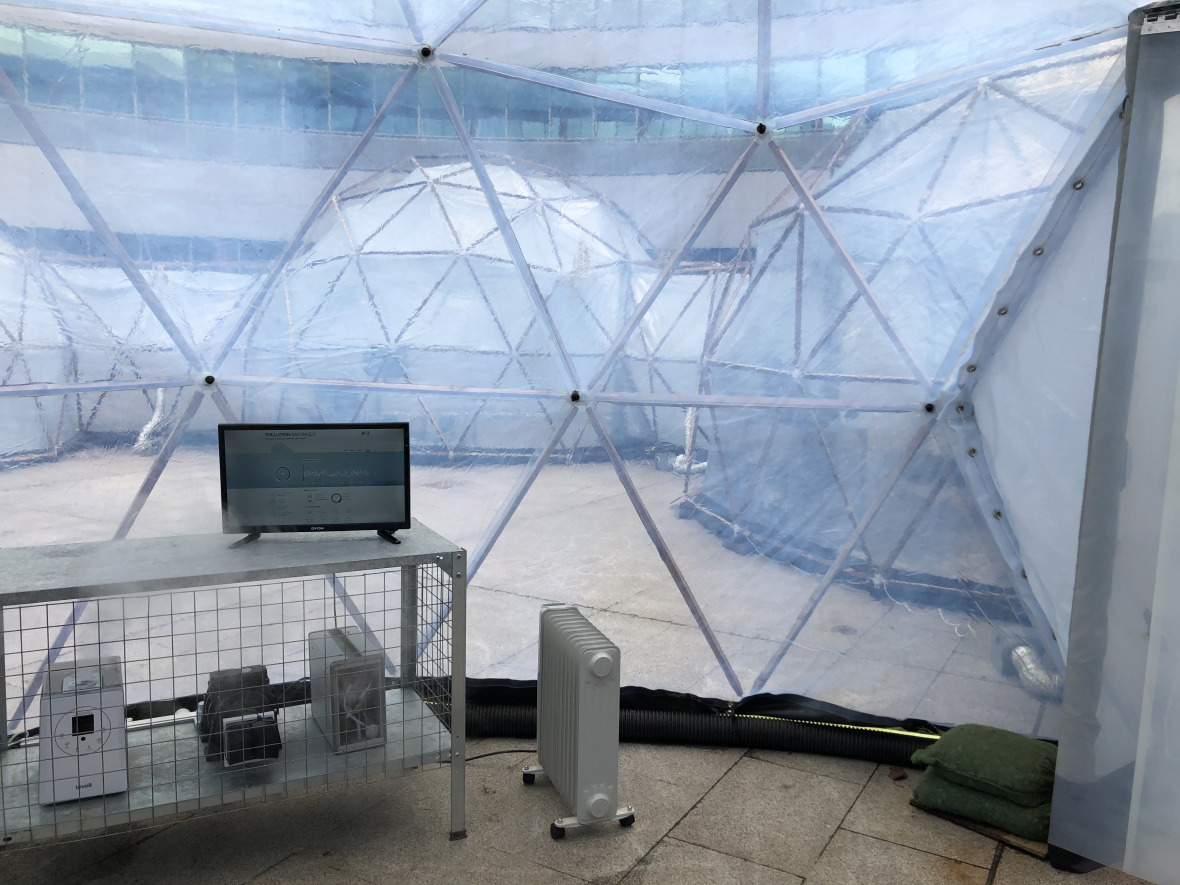
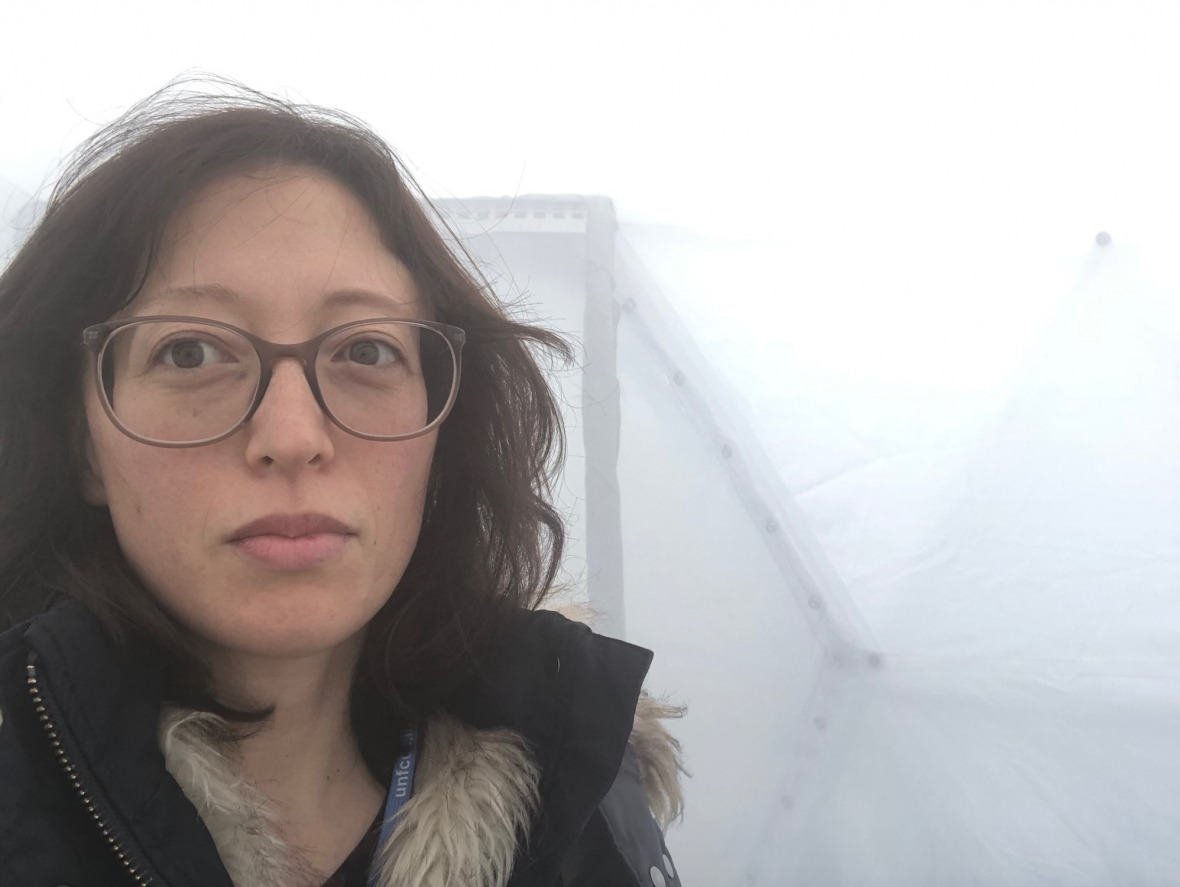
6 December 8:30 a.m.: Art at COP25 - Michael Pinsky’s Pollution Pods.
Hidden in a corner of the venue so that you have to seek them out – sadly, you won’t just stumble across them – is the Pollution Pods exhibit, promoted by the WHO and the BreatheLife campaign, among others. It is a series of five geodesic domes, filled with a mixture of nontoxic “perfumes” crafted to replicate the experience of air pollution in five different world cities: Trondheim, London, New Delhi, Beijing, and Sao Paolo. As someone who has had the experience of smelling and tasting the “real thing,” I could definitely tell the difference – but I enjoyed the immersive quality of the exhibit. In “New Delhi” the air is warm and humid and nearly opaque, and in Beijing it’s much colder – because Beijing’s worst air pollution episodes happen in winter. Attention to air pollution within the “climate space” can be seen around the COP, both at IASS events and others, but I would say the topic still hasn’t arrived in the mainstream. (Kathleen Mar)
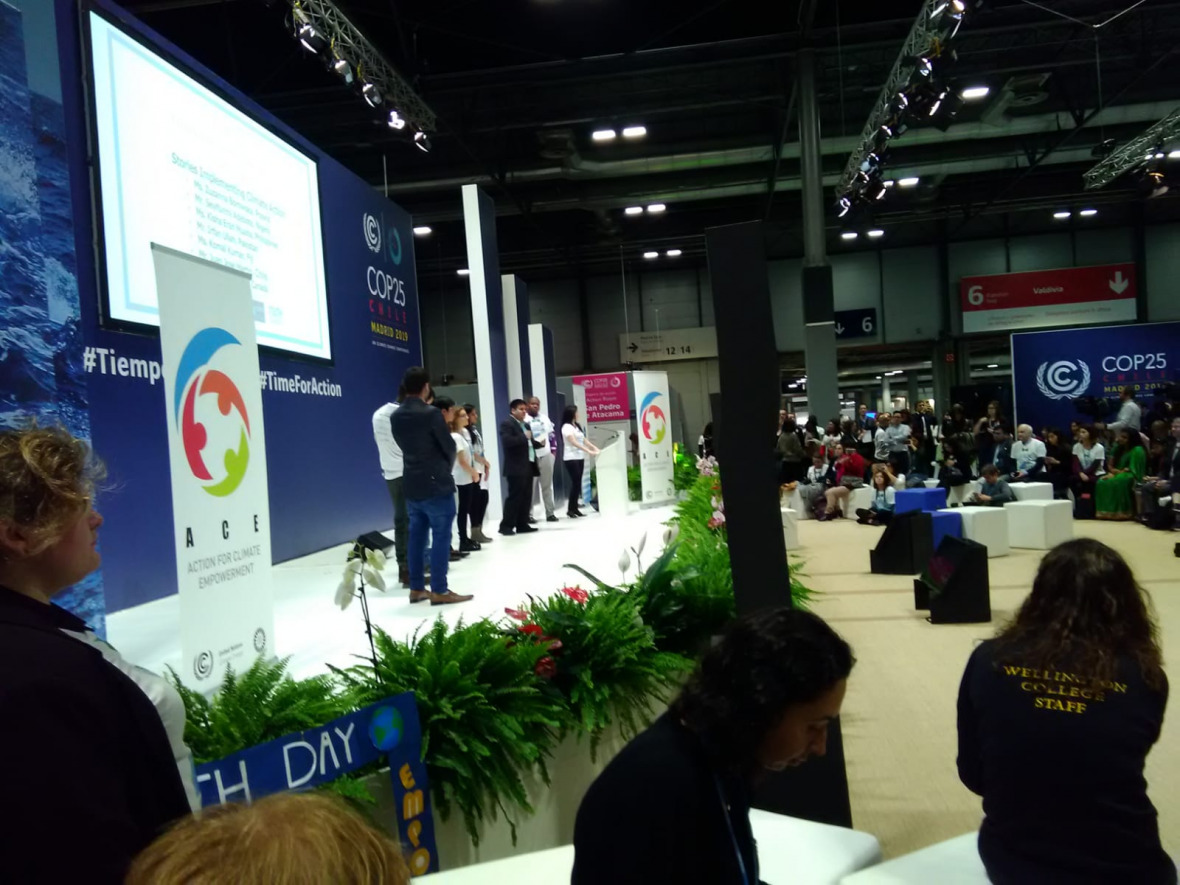

5 December 19.11 p.m.
In the run-up of COP 25, Brazilian Civil Society Organizations gathered in order to organize a pavilion for Brazil, since it was clear that there would no governmental one. They succeeded, and have an extremely full and interesting programme running throughout the COP. There was one slot reserved for a panel with the Brazilian governmental delegation followed by a conversation with Civil Society. Two representatives of Guaraní Youth in Brazil presented a document, explaining their needs and asking the delegates for a stronger engagement. Speech and document were strongly supported by the public, and so the contrast to the answer that followed by the delegate was even bigger. He said: „ When I was your age, I was a Greta. I was running around in the streets demanding for more action. When you will be my age, you will understand things are not so easy. When you will be my age, this issue will not be resolved and you will understand things will have to be approached differently“. This statement generated a lot criticism - one glimmer of hope. (Deborah Ferreira)

5 December 15:45 p.m.
"We are supposed to be the leaders for tomorrow, but how can we be that, if the world of tomorrow is not going to exist as we know it?"
"Takeaway from the demands of German NGOs to the German delegation: Restore the European leadership role, e.g. by communicating in the coming 'political' week that the EU will have delivered a more ambitious, 'updated' NDC in October 2020!"
"One of the main issues in the COP negotiations, 'market mechanisms', is still at the very beginning: Interests range from the desire to create a simple financial transfer mechanism, to the hope of improved cooperation, to the fear of opening new loopholes for unambitious goals; and others want to get rid of Article 6 of the Paris Agreement." (Charlotte Unger)
5 December 14:25 Colombian Pavillion at COP25
NGO and Ministry representatives talking about the importance and meaning of participatory approaches. "International cooperation projects genrally don't take the necessary time. They come to us, want to implement projects without knowing the context, and then leave again. Participatory approaches also should mean taking the time it needs to make participation meaningful and sustainable" (Deborah Ferreira)
5 December 14:00 p.m. Ocean Science Session
5 Decmeber 12:28 p.m. - Experts' meeting
This morning I had another chance to catch up with Nico Kreibich, climate policy expert from the Wuppertal Institute. He is following the negotiations on Article 6 (market mechanisms) closely – or at least as closely as possible given that most negotiations are happening behind closed doors. The general sentiment is that negotiations are rather stuck, and that it’s very difficult to come to agreement on important issues such as how to ensure environmental integrity in carbon markets. And what happens if no agreement is reached? Well, no one is really sure, but it’s probably not the case that the world would simply give up on carbon markets – instead, it’s likely that market mechanisms would continue to be pursued in different contexts, but without the transparency and integrity that strong rules for Article 6 could ensure. (Kathleen Mar)
4 December 2019, 6.30 p.m.
In the panel discussion "Negative Emissions: The Emerging Debate" organized by Liechtenstein and the Climate Strategies climate expert network, Matthias Honegger addresses the question of what role the removal of CO2 from the atmosphere could play in climate protection under the Paris Agreement. Janos Pasztor, Jo House and Shuchi Talati will also take part in the discussion moderated by Andrzej Blachowicz.
4 December 2019, 6 p.m.: Ocean-Climate Platform
At the COP the Ocean-Climate Platform launched their policy-recommendations “A Healthy Ocean, A Protected Climate." The IASS presented the section on Sustainable Finance. "We need innovative financing to bring about the transition at the scape and complexity that we need to combat climate change. In addition, we need structures such as ocean-finance trust funds. SeyCCAT is such a structure!" (Thorsten Thiele)
4 December 2019, 4.10 p.m.
A technical working group on agriculture was set up in 2017 to discuss climate-relevant issues in agriculture. The group's fourth workshop is focused on improved nutrient and fertiliser management. Experts as well as government representatives are contributing. Especially interesting for our work: are the possibilities of removing CO2 from the atmosphere being addressed? So far this does not seem to be the case. (Matthias Honegger)
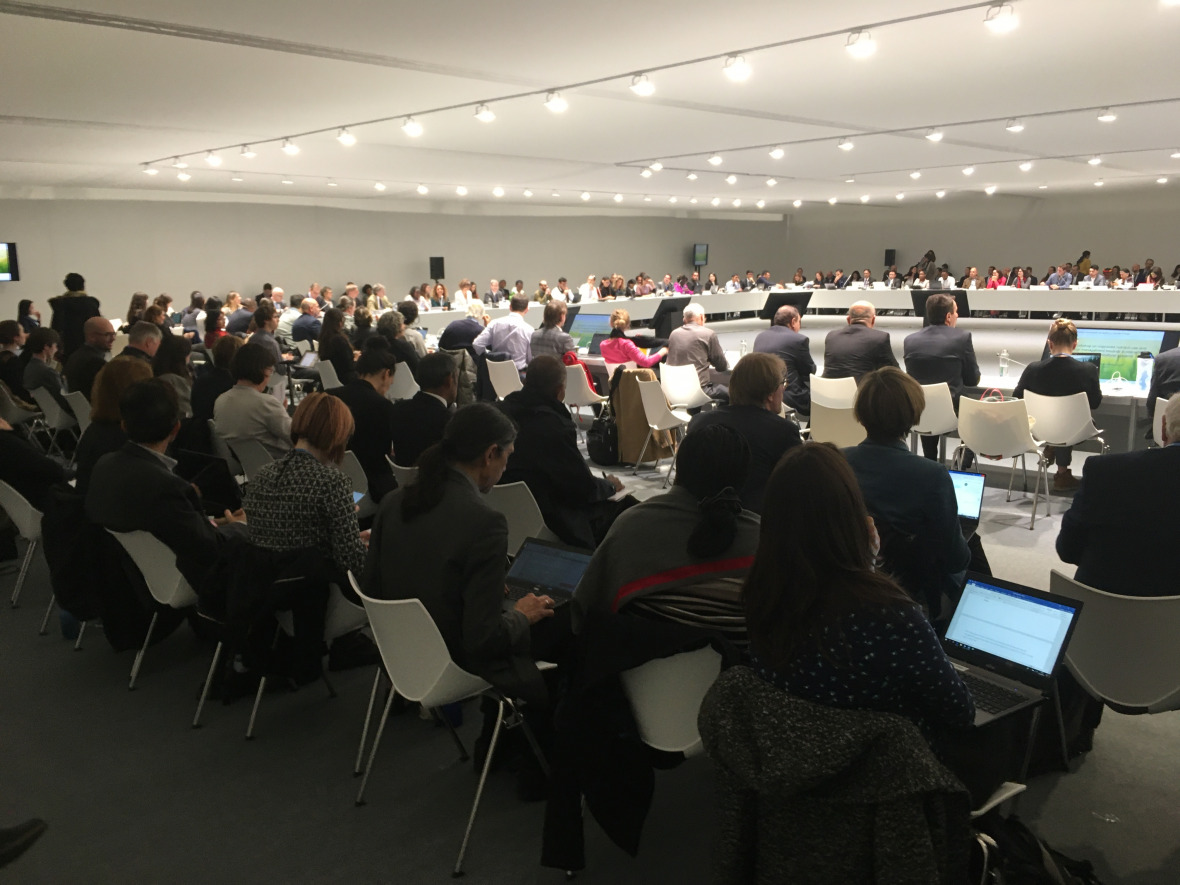
Media
Mark Lawrence at COP25 - Video by Héctor Rodriguez Chávez
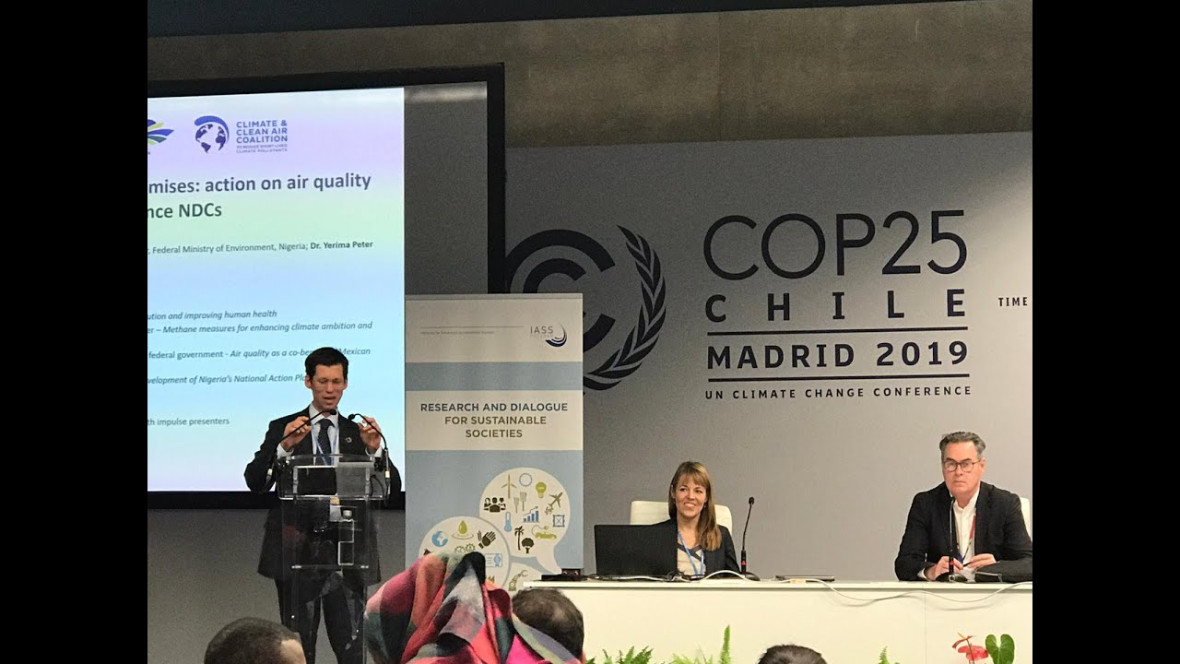
4 December 2019, 16:10
A technical working group on agriculture was set up in 2017 to discuss climate-relevant issues in agriculture. The group's fourth workshop is focused on improved nutrient and fertiliser management. Experts as well as government representatives are contributing. Especially interesting for our work: are the possibilities of removing CO2 from the atmosphere being addressed? So far this does not seem to be the case. (Matthias Honegger)
4 December 2019, 13:41
IASS Director Mark Lawrence urges to transform knowledge to the actionable level. Our key co-benefit health results in South Africa and India regarding air quality will be shared today in Room 1 at COP25. (Mara Gomez)
4 December, 13:30 Panel about Air Pollution
Marc Lawrence highlights the great potential of NDCs to reviving climate politics. Within transnational corporations we try to strengthen solidarity and the inclusion of stakeholders.
We actually need Climate Change - but not in physical but cultural terms. We need to change our actions cooperation, says Marc Lawrence - meet him at #ReflectCop #COP25 (Laima Eicke)
Read what IISD reports about this Discussion Panel: Strengthening Climate Promises: Action on Air Quality to Enhance Nationally Determined Contributions (NDCs)
"Strengthening Climate Promises: Near-term Mitigation via Joint Action on NDC Provisions and Air Quality"
4 December 2019, 10:47: Women Empowerment!
"A journey of a thousand miles begins with a single step” - Join us at our special event “Why do We Need Women Leadership for Planetary Health?”
"Everyone agrees that health is important. Almost nobody wants to pay for it. Time to bridge this gap!" IASS Dialogue and Reflection Pace (Hall 6) Women Empowerment is the key to overcome the Climate Crisis. (Nicole de Paula)
Reflection & Dialogue at COP25 about "The power of communication choices. How do we communicate with each other?"
03. December 2019, 12.30 p.m.: Cobenefits
How do we go from high-level discussions of the Cobenefits of renewable energies to realizing them on the ground? Hector Rodriguez stresses the importance of ownership and capacity building at the IASS and Climate Strategies side event. Example for what is going wrong: In Mexico you can get a car loan with an interest rate of 8%, and a loan for rooftop solar panels for an interest rate of 15% - despite the fact that cars start losing value as soon as you drive them off the lot. “The innovation of the Paris Agreement is its bottom-up approach on the country-level, but a bottom-up approach within countries for developing NDS isn’t there yet,” says IASS-colleague Deborah Ferreira. What can this kind of participation look like?
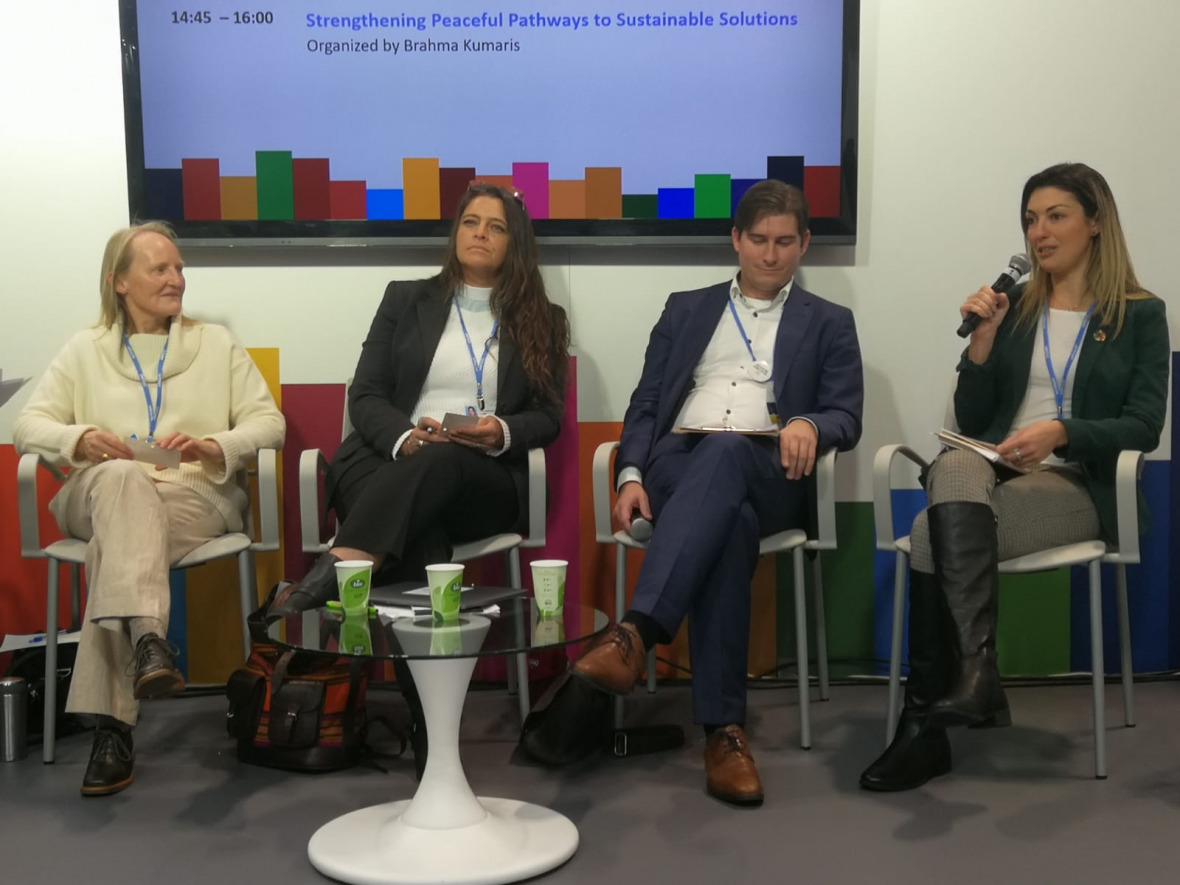

03. December 2019, 10:59: Laima Eicke presents new IASS-Policy Brief
Lead author Laima Eicke presents our new IASS-Policy Brief Countering the risk of an uneven low-carbon energy transition at COP25 with recommendations to prevent inequality between countries, many of them need commitments for financial and technical assistance to speed up their energy transition processes to the degree required by the Paris Agreement. For example, countries that are unable to phase out fossil fuels quickly enough are at risk of being excluded from international trade and value chains.
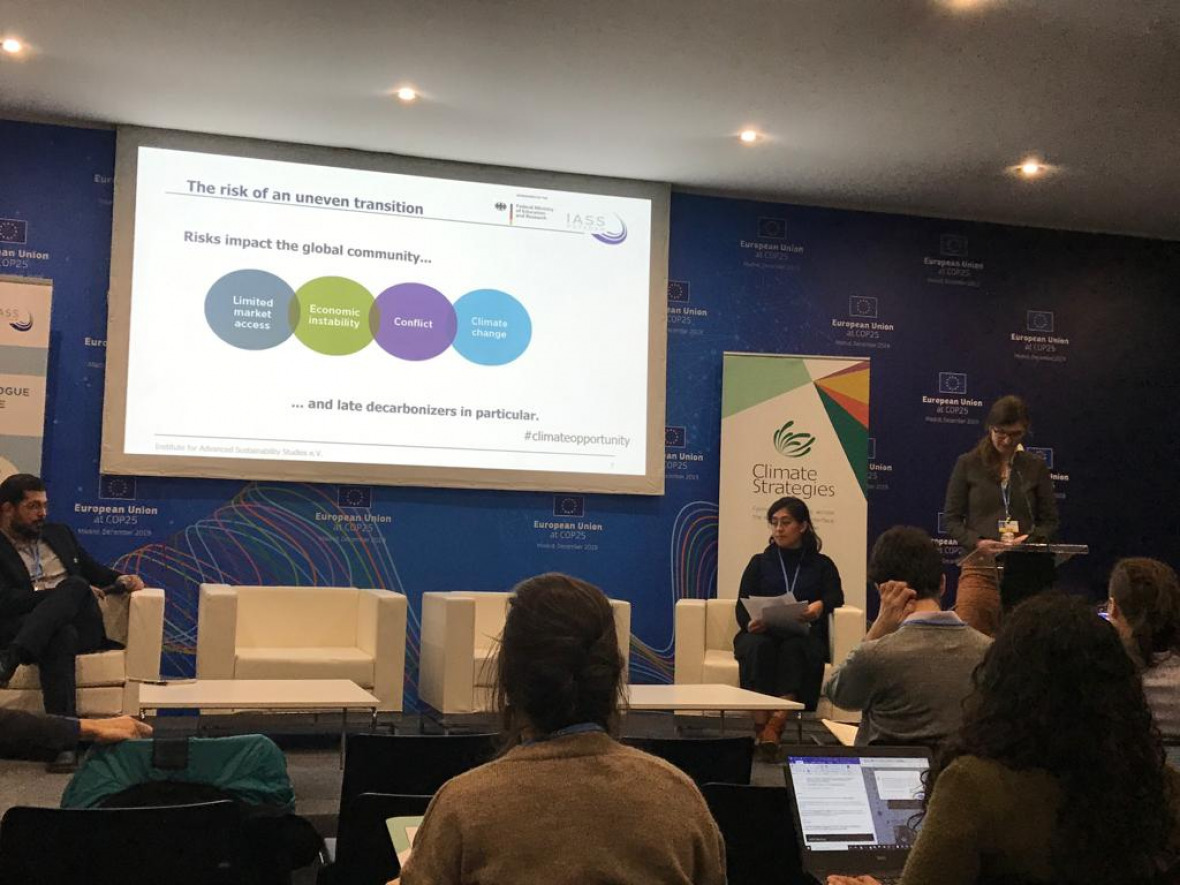
3 December, 10:20. a.m.
Demanding loss and damage funds and climate finance for 1.5 degrees: this morning’s protest action at COP25 by Asian Peoples' Movement on Debt and Development and others. (Kathleen Mar)
2 December 2019, 10:09 p.m.
What can we expect from the negotiations at COP25? I asked climate policy expert Nicolas Kreibich from the Wuppertal Institute before the start of the COP. His answer: in Madrid negotiators need to agree on robust principles for Market Mechanisms (Article 6). But that doesn’t mean the rulebook for Article 6 will be “finished” – for that he expects work to continue throughout 2020. This realism, which I have also heard echoed by German climate negotiators, runs contrary to the hopes of many observers – who I anticipate will be frustrated in the case of a still-unfinished rulebook at the end of next week. (Kathleen Mar)
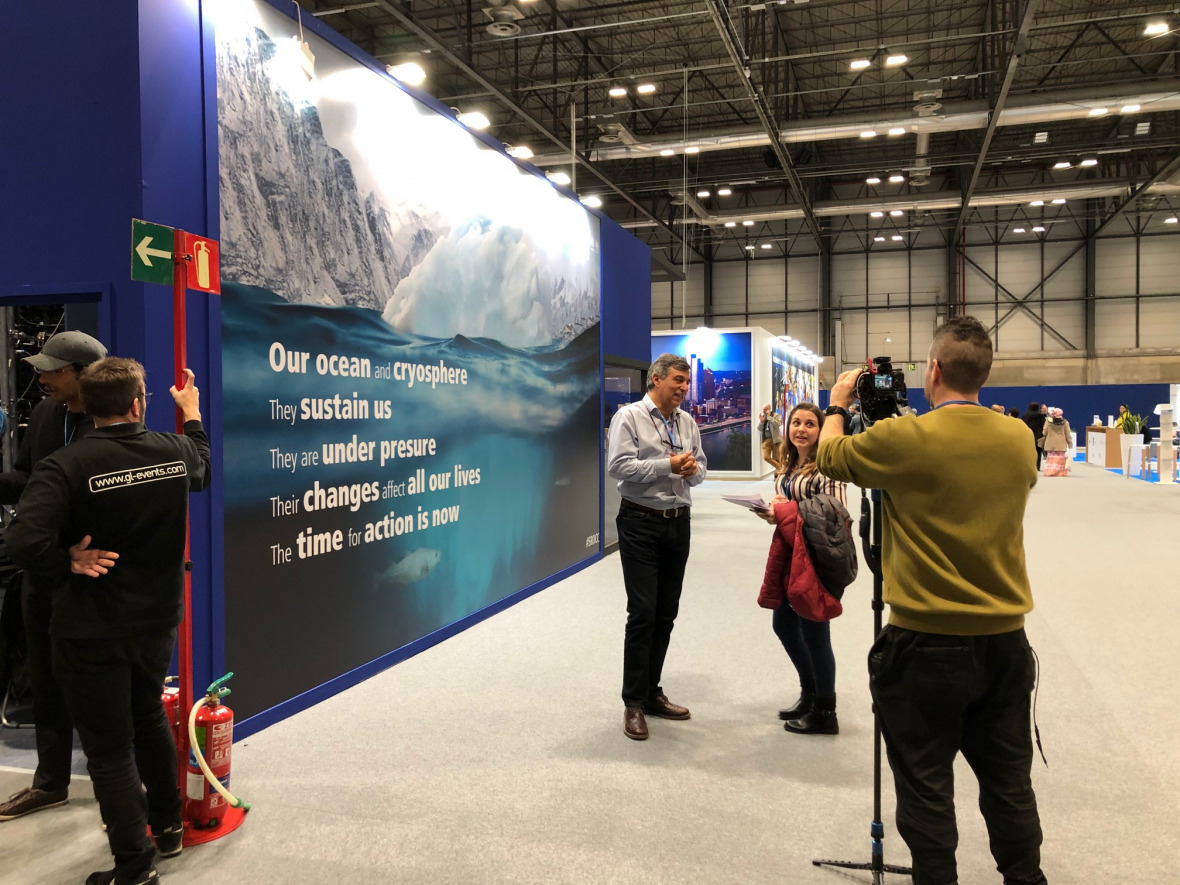
2 December 2019, 7:49 p.m.
Seyifunmi Adebote, Environmentalist and Team Lead at ICCDI Africa, participated in our conversation on the culture of COP and hosted the first guest session of our Dialogue and Reflection Space today. He commented afterwards: “People told me the COP was like a marketplace...which is what makes a dialogue space like this special.” (Kathleen Mar)
2 December 2019, 2.33 p.m.
Prominence of the Amazon Region at COP25: Several side-events are being held around this region, underlining the importance of bringing forward action in the Amazon to be able to tackle the issue of climate change on a global level. Climate Alliance COICA ( Coordinadora de las Organizaciones Indígenas de la Cuenca Amazónica ): "Problems indigenous peoples have to face are not just problems for indigenous peoples, but affect all." (Deborah Ferreira)

2 December 2019, 1 p.m.: Start of the IASS-Reflection and Dialogue Space
Awesome quick start session at the Reflection and Dialogue Space this morning. A full house discussing our expectations and the duality at COP25: inspiration and benchmarking is a common goal, but also impact at the granular level! (Mara Gomez)
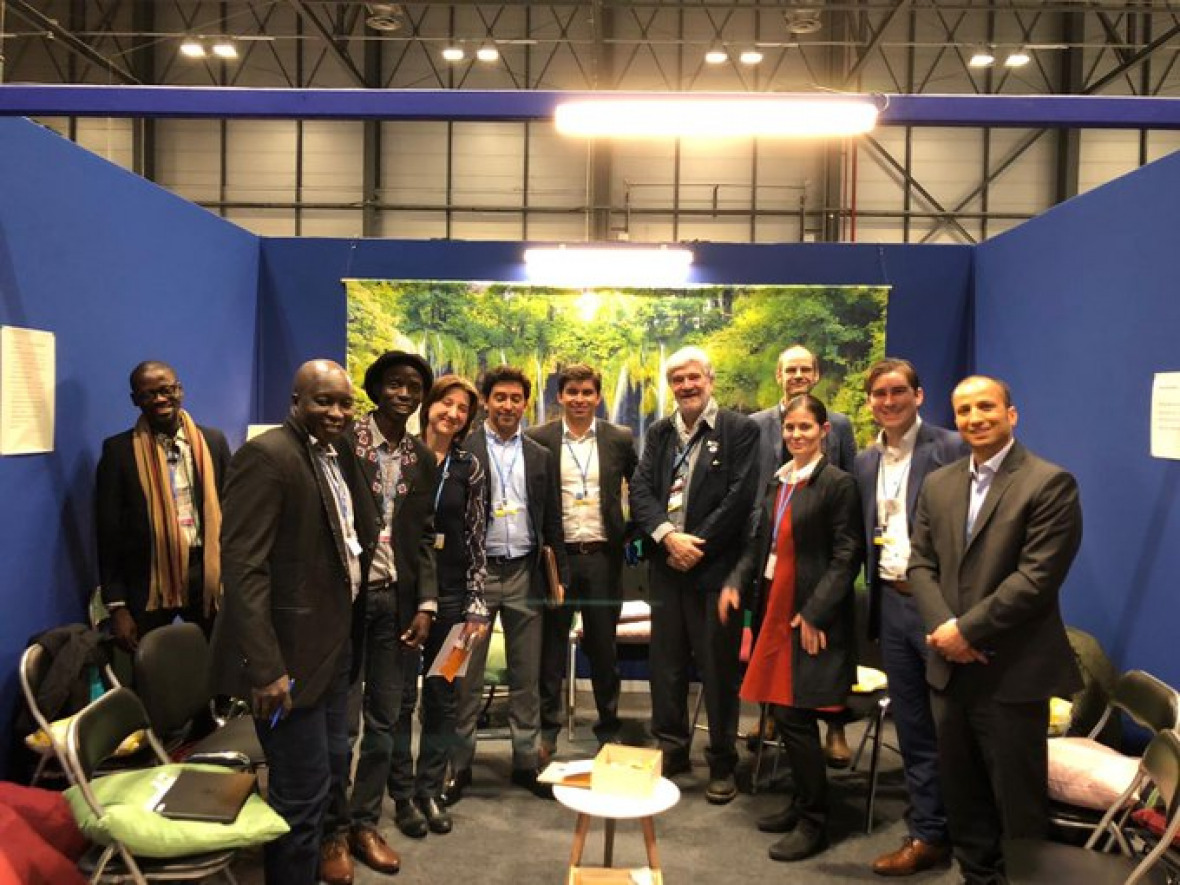
2 December, 11:15 a.m.: Opening of COP25 in Madrid
"We do not need an incremental approach, we need a transformational one." António Guterres at the COP opening speech urging for a substantially stronger ambition needing to happen now. Expressing his frustration about the slow pace of this process he urges the countries to use this COP to make a difference. "We have no time to spare. We must demonstrate a firm determination in reaching the goals we promised to reach with the Paris Agreement." (Deborah Ferreira)
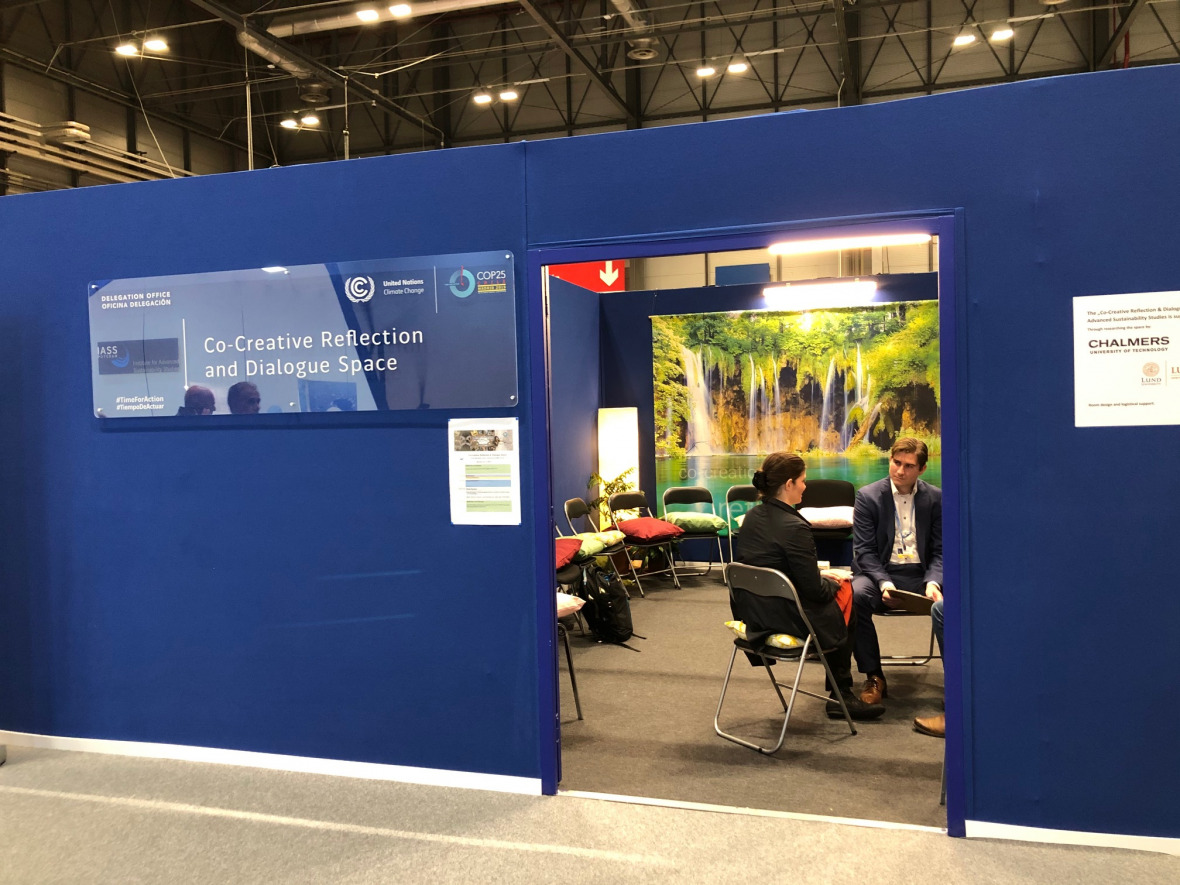
2 December, 11. a.m.: The IASS Reflection & Dialogue Space
Beginning shortly: Reflection & Dialogue on the culture of the COP. How do we experience it? In the Co-Creative Reflection & Dialogue Space, Hall 6. (Kathleen Mar)
30 November 2019, 6 p.m.: Getting ready for COP25
Getting ready for COP25, today we are setting up the „Co-Creative Reflection & Dialogue Space", in Hall 6, near the entrance. Looking forward to inspiring conversation, deep reflection and co-creation! (Carolin Fraude)
